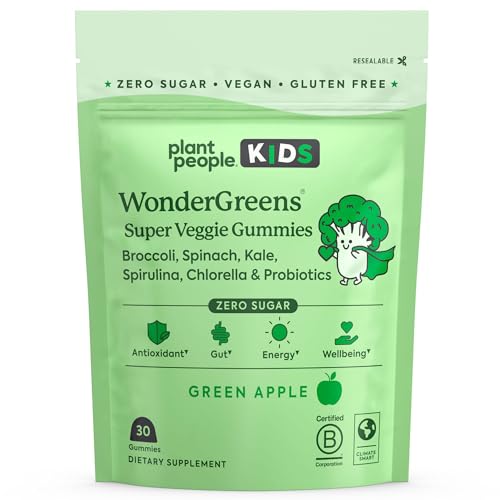


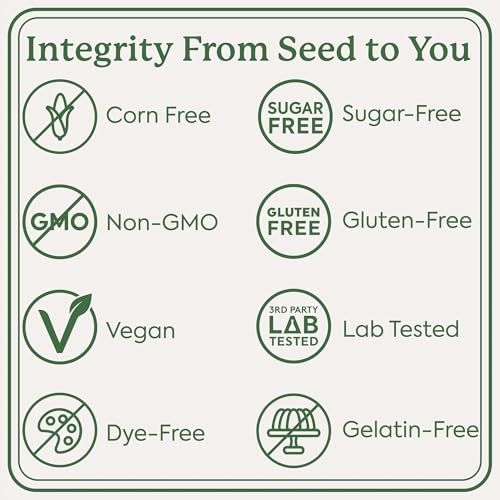

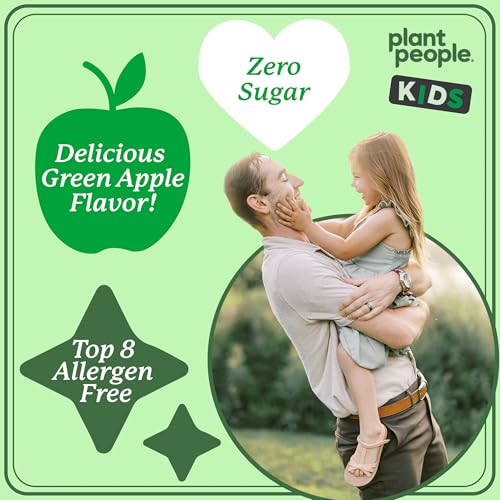
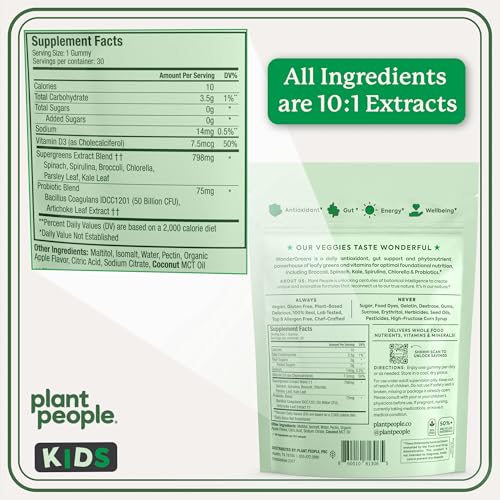
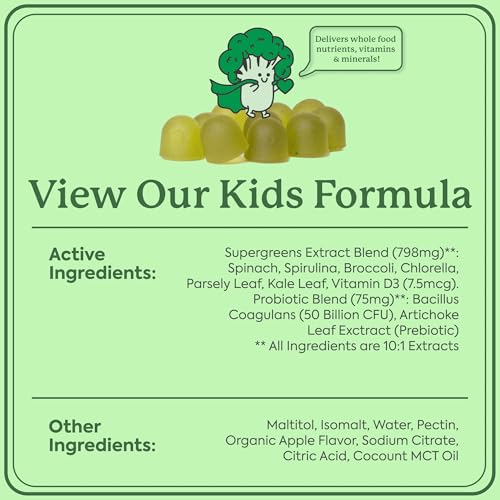
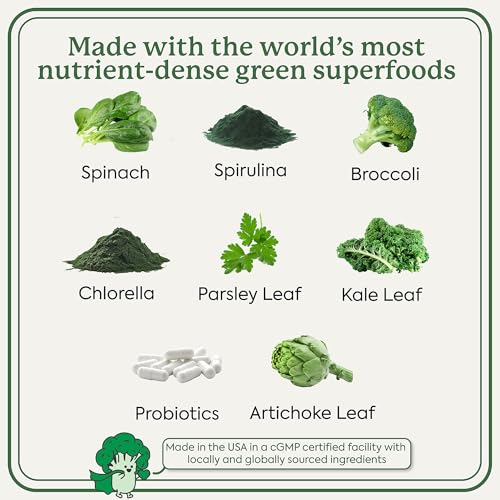
Plant People Kids WonderGreens Gummies - Boost Immunity & Digestion, Organic Apple Flavor - 30 Count


Vitamin D3
High RiskVitamin D3, also known as cholecalciferol, is a fat-soluble vitamin important for calcium metabolism and bone health. It is synthesized in the skin upon exposure to sunlight and is also found in some foods and supplements. Its primary function is to promote the absorption of calcium and phosphorus in the body.
Sustai Insights
Vitamin D3 offers functional benefits such as supporting bone health and immune function. However, excessive intake can lead to toxicity, presenting risks like hypercalcemia. Environmental concerns include its potential for bioaccumulation. Regulatory bodies impose usage restrictions due to these risks, resulting in a high overall risk assessment. Safe usage practices should be observed, and alternatives such as vitamin D2 may be considered.
Citric Acid
Medium RiskCitric acid is an alpha hydroxy acid used in personal care products primarily for its role as a pH adjuster and natural preservative. It occurs naturally in citrus fruits and is commonly utilized in various formulations for its chelating properties and mild exfoliation benefits.
Sustai Insights
Citric acid offers functional benefits as an effective preservative and pH stabilizer, contributing to product longevity and stability. It is biodegradable and derived from renewable sources. Health risks are low, with minimal concerns regarding carcinogenicity, allergies, and reproductive toxicity. However, moderate use restrictions exist due to potential irritation at high concentrations. Environmental risks are limited, as citric acid is not known to accumulate in ecosystems. Regulatory agencies have no significant advisories against its use. Overall, it is assessed as a medium-risk ingredient, with safe usage practices recommended and alternatives available.
Water
Low RiskWater is a clear, colorless liquid essential for various biological processes. It serves as a solvent in formulations, facilitating the dissolution of other ingredients and enhancing product texture and application. Additionally, water plays a crucial role in hydration and is a key component in many cosmetic and personal care products.
Sustai Insights
Water is an effective solvent and hydrator, contributing to the texture and efficacy of formulations. It is biodegradable and generally regarded as safe, with low concerns regarding carcinogenicity, allergies, and reproductive toxicity. However, excessive water usage can lead to environmental concerns, particularly regarding resource depletion. Regulatory bodies do not impose restrictions on water use in cosmetics. Overall, the risks associated with water are low, making it a safe and essential ingredient.
Spinacia Oleracea (Spinach)
Low RiskSpinacia oleracea (spinach) is a leafy green vegetable known for its nutrient density and is commonly used in various food products for its flavor and health benefits. It contains vitamins, minerals, and antioxidants, making it a popular ingredient in salads, smoothies, and dietary supplements.
Sustai Insights
Spinach offers functional benefits such as nutrient enrichment and antioxidant properties, contributing positively to health. It is sustainably sourced and biodegradable. Health risks are minimal, with low concerns regarding carcinogenicity, allergies, or reproductive toxicity. Environmental hazards are low, and it poses no regulatory warnings. Overall, it is assessed as a low-risk ingredient suitable for various uses.
Cynara Scolymus (Globe Artichoke) Leaf Extract
Low RiskCynara scolymus (globe artichoke) leaf extract is derived from the leaves of the artichoke plant. It is commonly used in cosmetic and personal care products for its potential antioxidant properties and contribution to skin hydration. The extract may also be utilized for its emulsifying capabilities and as a natural preservative.
Sustai Insights
Cynara scolymus leaf extract offers functional benefits such as antioxidant properties and skin hydration, and it is generally recognized as low risk for health concerns, including carcinogenicity and allergenic potential. There are no significant environmental risks associated with its use, and it is not currently restricted by regulatory agencies. Safe usage practices include patch testing for sensitive skin. Overall, the ingredient is assessed to have a low risk profile, making it a suitable choice in various formulations.
Spirulina
Low RiskSpirulina is a blue-green microalga known for its high nutritional profile, including proteins, vitamins, and antioxidants. It is commonly used as a dietary supplement and ingredient in health foods, offering various functional benefits such as promoting energy and supporting immune health.
Sustai Insights
Spirulina is recognized for its functional benefits, including high protein content and antioxidant properties, making it a valuable dietary supplement. It is sustainably sourced and biodegradable. Health risks are minimal, with low concerns regarding carcinogenicity, allergies, or reproductive toxicity, and it is not subject to significant regulatory restrictions. Overall, the risk level is assessed as low, indicating a favorable profile for use in food and supplements.
Isomalt
Low RiskIsomalt is a mixture of polysaccharides produced from sucrose, primarily used as a sugar substitute in various food and cosmetic products due to its functional properties such as sweetness and stability. It is often valued for its lower caloric content compared to traditional sugars.
Sustai Insights
Isomalt serves effectively as a sweetener and bulking agent, contributing to product texture and flavor without the high caloric content of sugar. It is considered low-risk concerning health effects, with minimal concerns regarding carcinogenicity, allergies, or reproductive toxicity. Environmentally, isomalt is not classified as a significant pollutant and poses low bioaccumulation risk. While regulatory bodies do not impose strict limitations, it is noted that certain formulations should avoid excess isomalt. Overall, isomalt presents a low-risk profile, making it a suitable choice in formulations.
Sodium Citrate
Low RiskSodium citrate is used in cosmetic formulations primarily as a buffering agent, helping to stabilize pH levels. It is derived from citric acid and is commonly found in various personal care products to enhance their efficacy and stability.
Sustai Insights
Sodium citrate offers functional benefits such as effective pH regulation and acts as a mild preservative. It is generally recognized as safe with low risks for cancer, allergies, and reproductive toxicity. Environmental concerns are minimal, with no significant pollutant potential or bioaccumulation. Regulatory bodies like the FDA and COSMOS have no major restrictions on its use. Overall, sodium citrate presents a low risk, making it a viable ingredient in cosmetic formulations. Safe usage practices should be followed, and alternatives are not typically necessary.
Maltitol
Low RiskMaltitol is a disaccharide polyol derived from the hydrogenation of maltose. It is commonly used as a sugar substitute in various food and cosmetic products due to its sweetness and lower caloric content compared to traditional sugars. Maltitol functions primarily as a humectant and sweetener.
Sustai Insights
Maltitol provides functional benefits as a sweetening agent with lower glycemic impact and is often used in sugar-free products. It is considered to have low health risks, including a low potential for carcinogenicity, allergy, and reproductive toxicity. Environmentally, it poses minimal risk as it is not bioaccumulative. Regulatory status is favorable, with no significant restrictions noted. Overall, maltitol is assessed as low risk, making it a suitable ingredient in appropriate concentrations.
Apple Pectin
Low RiskApple pectin is a natural polysaccharide found in the cell walls of apples. It is commonly used as a gelling agent, thickener, and stabilizer in food products, as well as in cosmetics and pharmaceuticals. Its gelling properties are utilized to improve texture and consistency.
Sustai Insights
Apple pectin serves as an effective thickener and stabilizer, contributing to the texture of various products. It is biodegradable and derived from renewable sources, enhancing its sustainability profile. Health risks are minimal, with low concerns for carcinogenicity, allergies, or reproductive toxicity. Environmental impact is also low, with no known pollutants or bioaccumulation issues. Regulatory status is clear, with no current restrictions. Overall, the risk level associated with apple pectin is low, making it a safe ingredient for use in formulations.
Water
Low RiskWater is a clear, colorless liquid essential for various biological processes. It serves as a solvent in formulations, facilitating the dissolution of other ingredients and enhancing product texture and application. Additionally, water plays a crucial role in hydration and is a key component in many cosmetic and personal care products.
Sustai Insights
Water is an effective solvent and hydrator, contributing to the texture and efficacy of formulations. It is biodegradable and generally regarded as safe, with low concerns regarding carcinogenicity, allergies, and reproductive toxicity. However, excessive water usage can lead to environmental concerns, particularly regarding resource depletion. Regulatory bodies do not impose restrictions on water use in cosmetics. Overall, the risks associated with water are low, making it a safe and essential ingredient.
Citric Acid
Medium RiskCitric acid is an alpha hydroxy acid used in personal care products primarily for its role as a pH adjuster and natural preservative. It occurs naturally in citrus fruits and is commonly utilized in various formulations for its chelating properties and mild exfoliation benefits.
Sustai Insights
Citric acid offers functional benefits as an effective preservative and pH stabilizer, contributing to product longevity and stability. It is biodegradable and derived from renewable sources. Health risks are low, with minimal concerns regarding carcinogenicity, allergies, and reproductive toxicity. However, moderate use restrictions exist due to potential irritation at high concentrations. Environmental risks are limited, as citric acid is not known to accumulate in ecosystems. Regulatory agencies have no significant advisories against its use. Overall, it is assessed as a medium-risk ingredient, with safe usage practices recommended and alternatives available.
Spinacia Oleracea (Spinach)
Low RiskSpinacia oleracea (spinach) is a leafy green vegetable known for its nutrient density and is commonly used in various food products for its flavor and health benefits. It contains vitamins, minerals, and antioxidants, making it a popular ingredient in salads, smoothies, and dietary supplements.
Sustai Insights
Spinach offers functional benefits such as nutrient enrichment and antioxidant properties, contributing positively to health. It is sustainably sourced and biodegradable. Health risks are minimal, with low concerns regarding carcinogenicity, allergies, or reproductive toxicity. Environmental hazards are low, and it poses no regulatory warnings. Overall, it is assessed as a low-risk ingredient suitable for various uses.
Cynara Scolymus (Globe Artichoke) Leaf Extract
Low RiskCynara scolymus (globe artichoke) leaf extract is derived from the leaves of the artichoke plant. It is commonly used in cosmetic and personal care products for its potential antioxidant properties and contribution to skin hydration. The extract may also be utilized for its emulsifying capabilities and as a natural preservative.
Sustai Insights
Cynara scolymus leaf extract offers functional benefits such as antioxidant properties and skin hydration, and it is generally recognized as low risk for health concerns, including carcinogenicity and allergenic potential. There are no significant environmental risks associated with its use, and it is not currently restricted by regulatory agencies. Safe usage practices include patch testing for sensitive skin. Overall, the ingredient is assessed to have a low risk profile, making it a suitable choice in various formulations.
Vitamin D3
High RiskVitamin D3, also known as cholecalciferol, is a fat-soluble vitamin important for calcium metabolism and bone health. It is synthesized in the skin upon exposure to sunlight and is also found in some foods and supplements. Its primary function is to promote the absorption of calcium and phosphorus in the body.
Sustai Insights
Vitamin D3 offers functional benefits such as supporting bone health and immune function. However, excessive intake can lead to toxicity, presenting risks like hypercalcemia. Environmental concerns include its potential for bioaccumulation. Regulatory bodies impose usage restrictions due to these risks, resulting in a high overall risk assessment. Safe usage practices should be observed, and alternatives such as vitamin D2 may be considered.
Spirulina
Low RiskSpirulina is a blue-green microalga known for its high nutritional profile, including proteins, vitamins, and antioxidants. It is commonly used as a dietary supplement and ingredient in health foods, offering various functional benefits such as promoting energy and supporting immune health.
Sustai Insights
Spirulina is recognized for its functional benefits, including high protein content and antioxidant properties, making it a valuable dietary supplement. It is sustainably sourced and biodegradable. Health risks are minimal, with low concerns regarding carcinogenicity, allergies, or reproductive toxicity, and it is not subject to significant regulatory restrictions. Overall, the risk level is assessed as low, indicating a favorable profile for use in food and supplements.
Isomalt
Low RiskIsomalt is a mixture of polysaccharides produced from sucrose, primarily used as a sugar substitute in various food and cosmetic products due to its functional properties such as sweetness and stability. It is often valued for its lower caloric content compared to traditional sugars.
Sustai Insights
Isomalt serves effectively as a sweetener and bulking agent, contributing to product texture and flavor without the high caloric content of sugar. It is considered low-risk concerning health effects, with minimal concerns regarding carcinogenicity, allergies, or reproductive toxicity. Environmentally, isomalt is not classified as a significant pollutant and poses low bioaccumulation risk. While regulatory bodies do not impose strict limitations, it is noted that certain formulations should avoid excess isomalt. Overall, isomalt presents a low-risk profile, making it a suitable choice in formulations.
Sodium Citrate
Low RiskSodium citrate is used in cosmetic formulations primarily as a buffering agent, helping to stabilize pH levels. It is derived from citric acid and is commonly found in various personal care products to enhance their efficacy and stability.
Sustai Insights
Sodium citrate offers functional benefits such as effective pH regulation and acts as a mild preservative. It is generally recognized as safe with low risks for cancer, allergies, and reproductive toxicity. Environmental concerns are minimal, with no significant pollutant potential or bioaccumulation. Regulatory bodies like the FDA and COSMOS have no major restrictions on its use. Overall, sodium citrate presents a low risk, making it a viable ingredient in cosmetic formulations. Safe usage practices should be followed, and alternatives are not typically necessary.
Maltitol
Low RiskMaltitol is a disaccharide polyol derived from the hydrogenation of maltose. It is commonly used as a sugar substitute in various food and cosmetic products due to its sweetness and lower caloric content compared to traditional sugars. Maltitol functions primarily as a humectant and sweetener.
Sustai Insights
Maltitol provides functional benefits as a sweetening agent with lower glycemic impact and is often used in sugar-free products. It is considered to have low health risks, including a low potential for carcinogenicity, allergy, and reproductive toxicity. Environmentally, it poses minimal risk as it is not bioaccumulative. Regulatory status is favorable, with no significant restrictions noted. Overall, maltitol is assessed as low risk, making it a suitable ingredient in appropriate concentrations.
Apple Pectin
Low RiskApple pectin is a natural polysaccharide found in the cell walls of apples. It is commonly used as a gelling agent, thickener, and stabilizer in food products, as well as in cosmetics and pharmaceuticals. Its gelling properties are utilized to improve texture and consistency.
Sustai Insights
Apple pectin serves as an effective thickener and stabilizer, contributing to the texture of various products. It is biodegradable and derived from renewable sources, enhancing its sustainability profile. Health risks are minimal, with low concerns for carcinogenicity, allergies, or reproductive toxicity. Environmental impact is also low, with no known pollutants or bioaccumulation issues. Regulatory status is clear, with no current restrictions. Overall, the risk level associated with apple pectin is low, making it a safe ingredient for use in formulations.
Discover Plant People Kids WonderGreens Super Veggie Gummies, a delicious way to nourish your child's health! Each gummy is a powerhouse of six super vegetables and Vitamin D3, ensuring your little ones enjoy their daily greens without any fuss.
- Kid-Friendly Nutrition: Packed with essential vitamins and minerals, these gummies support immunity, bone, vision, and digestion health, making them an ideal addition to your child's diet.
- Digestive Health Boost: With 100 billion CFU of prebiotics and probiotics, these gummies promote a healthy digestive system, helping maintain tummy comfort for active kids.
- Allergy-Friendly Formula: Crafted without sugar, high-fructose corn syrup, or food dyes, they're vegan, gluten-free, and safe for kids with top 8 allergen sensitivities, ensuring worry-free snacking.
- Nutrient Density: Each gummy delivers nutrients exceeding multiple servings of vegetables, providing powerful daily support for growing bodies.
- Eco-Conscious Packaging: Housed in recyclable, resealable pouches, these gummies are perfect for on-the-go nutrition while caring for the planet.
Empower your child's health with every delicious bite of Plant People Kids WonderGreens Super Veggie Gummies!
Subscribe & Save with Sustai
- Best Price Guarantee: Always enjoy the lowest prices on sustainable home essentials.
- No Surprises: We’ll notify you before shipping. No hidden fees, ever.
- You’re in Charge: Change, pause, or cancel your subscription anytime with ease.
- Eco-Friendly Deliveries: Our grouped shipments mean less packaging and lower emissions.
Join us on a sustainable journey. Special offers for a limited time! Prices and promotions may change.
Recommended Products
Discover Plant People Kids WonderGreens Super Veggie Gummies, a delicious way to nourish your child's health! Each gummy is a powerhouse of six super vegetables and Vitamin D3, ensuring your little ones enjoy their daily greens without any fuss.
- Kid-Friendly Nutrition: Packed with essential vitamins and minerals, these gummies support immunity, bone, vision, and digestion health, making them an ideal addition to your child's diet.
- Digestive Health Boost: With 100 billion CFU of prebiotics and probiotics, these gummies promote a healthy digestive system, helping maintain tummy comfort for active kids.
- Allergy-Friendly Formula: Crafted without sugar, high-fructose corn syrup, or food dyes, they're vegan, gluten-free, and safe for kids with top 8 allergen sensitivities, ensuring worry-free snacking.
- Nutrient Density: Each gummy delivers nutrients exceeding multiple servings of vegetables, providing powerful daily support for growing bodies.
- Eco-Conscious Packaging: Housed in recyclable, resealable pouches, these gummies are perfect for on-the-go nutrition while caring for the planet.
Empower your child's health with every delicious bite of Plant People Kids WonderGreens Super Veggie Gummies!

You can have at most 2 Sustainable Steals products in your cart
Customer Reviews
Customers’ View
Customers appreciate the delicious taste and health benefits of the Gummy Vitamins | Super Veggie Formula, noting that they make it easier for children to consume essential nutrients. Many users highlight the absence of sugar and food dyes, which aligns with their health-conscious values. One reviewer mentioned, 'These taste yummy! No complaints from the kids,' reflecting the product's kid-friendly appeal. While some customers caution that the gummies should not replace whole vegetables, they recognize the added nutritional support from the super greens and probiotics. The recyclable packaging also resonates with eco-conscious consumers. Overall, parents find these gummies a valuable addition to their children's diets, combining taste and nutrition in an enjoyable format.
AI-generated from the text of customer reviewsThis product has no reviews yet.




